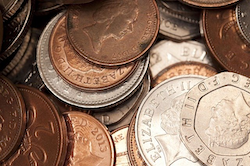Or search by topic
Number and algebra
Geometry and measure
Probability and statistics
Working mathematically
Advanced mathematics
For younger learners
Five More Coins



- Problem
- Teachers' Resources
This problem follows on from Five Coins so we would recommend looking at that one first.
 Ben has five coins in his pocket.
Ben has five coins in his pocket.
How much money might he have? If possible, talk to someone else about your ideas.
Can you name an amount of money that Ben's five coins couldn't add up to? Why couldn't he have that amount of money?
Dayna is trying to guess how much money Ben has. She knows that altogether he has less than £1.
Dayna starts writing down all the amounts of money less than £1 that Ben's five coins could add up to.
Could Ben have any amount of money between 5p and £1 in his pocket, or do you think there are some amounts that would be impossible for him to have?
Have a go at writing out Dayna's list of numbers, showing how Ben could make each total with five coins. If there are any numbers missing from the list, can you explain why these amounts are impossible for Ben to have?
You may also like
Prompt Cards
These two group activities use mathematical reasoning - one is numerical, one geometric.
Consecutive Numbers
An investigation involving adding and subtracting sets of consecutive numbers. Lots to find out, lots to explore.
Exploring Wild & Wonderful Number Patterns
EWWNP means Exploring Wild and Wonderful Number Patterns Created by Yourself! Investigate what happens if we create number patterns using some simple rules.

